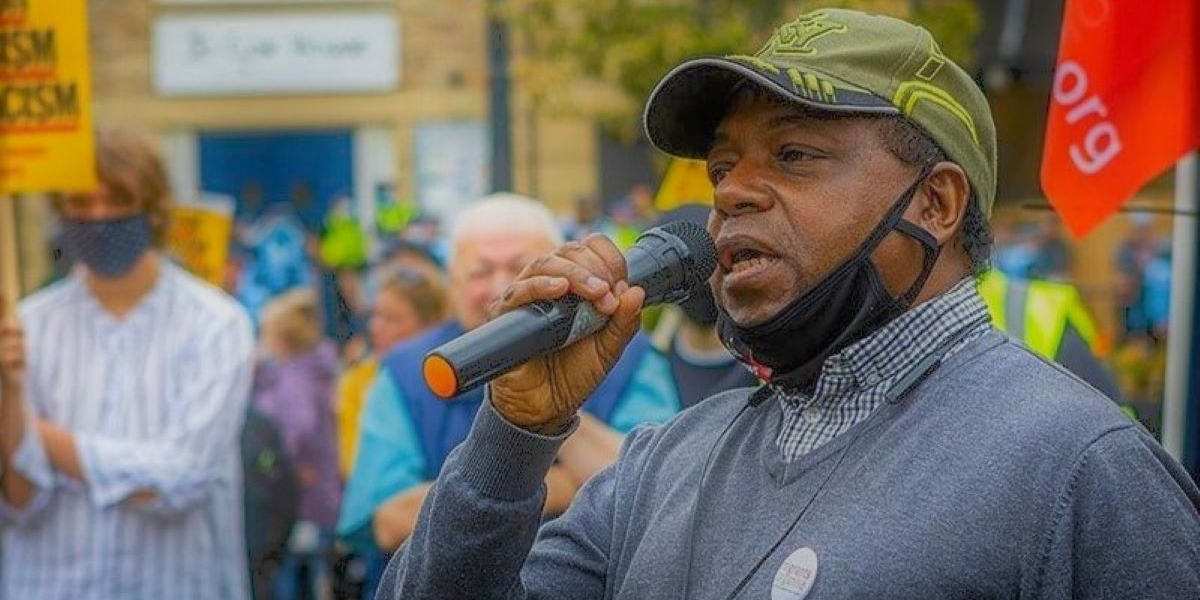I became involved in activism in secondary school and have never stopped. I joined a social democratic opposition party, becoming the leader’s private secretary before moving to the UK on a university scholarship. I later applied for asylum. I had no accommodation; there was no asylum support in the town where I was.
I volunteered for the Race Equality Council helping with raising awareness and events. Receiving an award for my volunteering encouraged me to continue working alongside migrants facing injustices. After five years living in limbo I was granted refugee status. The first protests I joined were about Chris Alder’s death in police custody. I felt very angry and shocked.
Migrants Organise was created in London 30 years ago. It now operates nationally but maintains the grassroots values it was founded upon. Our mission is to create a platform for migrants, refugees and our allies to act together, combining research, political education, advice, mentoring, organising and campaigning.
I am a regional organiser for Yorkshire and the Humber. People here are often isolated and demoralised, an objective of the hostile environment. Thankfully, technologies like Zoom and WhatsApp have made it easier to connect to regional and national agendas. I identify common causes, building people’s power to address the structural racism and injustice, and help build local coalitions.
People seeking asylum in Yorkshire are placed in detention centres, unsuitable accommodation and ‘digital detention’ (ankle monitors). They are subject to prolonged Home Office delays, raids and deportations. Unaccompanied children are not looked after by authorities. Migrant staff in health and social care and other jobs face institutional discrimination and abuse. Unfortunately, this includes within our own sector, too.
Migrants Organise helped set up the Justice for Simba Campaign for Zimbabwean refugee Simba Mujakachi, who was refused primary healthcare despite a medical condition. Following a stroke aged 30, he was in a two-week coma. The Sheffield NHS Trust served him with a £100,000 bill for his emergency operation, on top of earlier bills. I am pleased to say we won. The bills were scrapped, Simba has been given refugee status and his accommodation needs were met. He now campaigns for system change and for others in similar situations.
My activism for indigenous, minority and rights-based development in Africa positively impacts on my mental wellbeing. I use participatory action research, linking people with resources, advocacy and knowledge exchange. While addressing issues migrants face, we must also tackle those forcing people to migrate from their places of origin and dismantle the neocolonial system that sustains vile institutional racism. Disconnecting from our roots means succumbing to the violent colonial project that uprooted people from Africa, drastically attempting to erase their identities and histories. ‘We are here because they were there’ – but we do not have to conform to colonial uprooting.
The best way to organise against the hostile environment is together. Migrants Organise provides infrastructure for the Solidarity Knows No Borders (SKNB) community of resistance, based on the Fair Immigration Movement (FIRM) charter, which sets out objectives and organisational principles for structural change. It resulted from discussions among migrant and refugee communities, campaigners, politicians, caseworkers and volunteers. We are organising the second national SKNB summit this year.
We must smash the borders between and within movements. The crises around labour, climate, debt, cost of living, immigration etc are all linked. We need campaigners willing to work together for the long term.
Sarli Nana was speaking to Ananya Wilson-Bhattacharya










